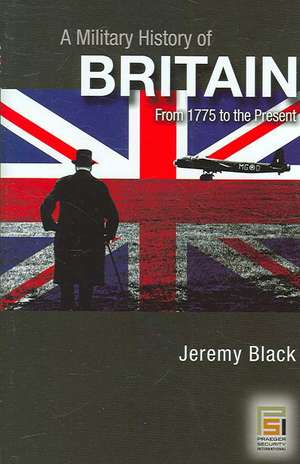A Military History of Britain: From 1775 to the Present
Autor Jeremy M. Blacken Limba Engleză Hardback – 29 oct 2006 – vârsta până la 17 ani
Preț: 461.00 lei
Preț vechi: 608.39 lei
-24% Nou
Puncte Express: 692
Preț estimativ în valută:
88.24€ • 95.88$ • 74.17£
88.24€ • 95.88$ • 74.17£
Carte tipărită la comandă
Livrare economică 21 aprilie-05 mai
Preluare comenzi: 021 569.72.76
Specificații
ISBN-13: 9780275990398
ISBN-10: 0275990397
Pagini: 208
Dimensiuni: 156 x 235 x 22 mm
Greutate: 0.47 kg
Editura: Bloomsbury Publishing
Colecția Praeger
Locul publicării:New York, United States
ISBN-10: 0275990397
Pagini: 208
Dimensiuni: 156 x 235 x 22 mm
Greutate: 0.47 kg
Editura: Bloomsbury Publishing
Colecția Praeger
Locul publicării:New York, United States
Notă biografică
Jeremy Black, is Professor of History at Exeter University in the United Kingdom. His books include The British Seaborne Empire, War and the World 1450-2000, War since 1945, and Altered States: America since the Sixties. He is a Fellow of the editorial board of the Royal United Services Institute and a Fellow of the Royal Society for the Encouragement of Arts, Manufactures and Commerce.
Recenzii
Black organizes this account of British military structures and cultures, and relevant socio-political contexts, as well as of conflicts not in relation to Britain's European rivals France or Germany, but in relation to the US. Thus, the book's three sections are titled Imperial Parent, Imperial Rival, and Imperial Partner..Recommended. Libraries with national-security collections; graduate students and faculty.
Black begins this concise and comprehensive military history with an overview going back to the Roman invasion of Britain in 55 and 54 B.C.E. The book is organized into three parts: Britain as imperial parent (through 1775), as imperial rival (1775-1904), and as imperial partner (from 1904). The first part deals with Britain's maritime tradition, its relatively small army, and its growing struggle with France. The second part begins with the War for American Independence, covers the rise of Napoleon, and ends with the ascendancy of Great Britain as the master of imperialism. The third part concentrates on the role of Britain as imperial partner in the 20th century and the challenges contained therein: the retraction of Britain's Far Eastern policies, its membership in NATO, and modern conflicts from the Falklands to Iraq. Black presents new perspectives on his subject (since military history cannot be studied in a vacuum) and thus challenges established assumptions (e.g., that the Crimean failures were owing simply to aging generals). His discussion of military history as an interrelated part of the nation's history is most enlightening. Recommended.
Military structures and cultures, relevant sociological contexts, and the conflicts themselves are part of the story that Black tells. The early 21st century, he says, provides a different perspective than did the Cold War, and so he chooses some surprising topics to follow down the three centuries. The series being American, he devotes much attention to cross-Atlantic military relations, mostly after the unfortunate dust-up in the 1770s, oh yes, and that 1812 misunderstanding.
Intellectually questioning, Black's study cultivates an understanding of the resources and doctrines underlying the British military panorama of battles, leaders, and soldiers.
Black begins this concise and comprehensive military history with an overview going back to the Roman invasion of Britain in 55 and 54 B.C.E. The book is organized into three parts: Britain as imperial parent (through 1775), as imperial rival (1775-1904), and as imperial partner (from 1904). The first part deals with Britain's maritime tradition, its relatively small army, and its growing struggle with France. The second part begins with the War for American Independence, covers the rise of Napoleon, and ends with the ascendancy of Great Britain as the master of imperialism. The third part concentrates on the role of Britain as imperial partner in the 20th century and the challenges contained therein: the retraction of Britain's Far Eastern policies, its membership in NATO, and modern conflicts from the Falklands to Iraq. Black presents new perspectives on his subject (since military history cannot be studied in a vacuum) and thus challenges established assumptions (e.g., that the Crimean failures were owing simply to aging generals). His discussion of military history as an interrelated part of the nation's history is most enlightening. Recommended.
Military structures and cultures, relevant sociological contexts, and the conflicts themselves are part of the story that Black tells. The early 21st century, he says, provides a different perspective than did the Cold War, and so he chooses some surprising topics to follow down the three centuries. The series being American, he devotes much attention to cross-Atlantic military relations, mostly after the unfortunate dust-up in the 1770s, oh yes, and that 1812 misunderstanding.
Intellectually questioning, Black's study cultivates an understanding of the resources and doctrines underlying the British military panorama of battles, leaders, and soldiers.




